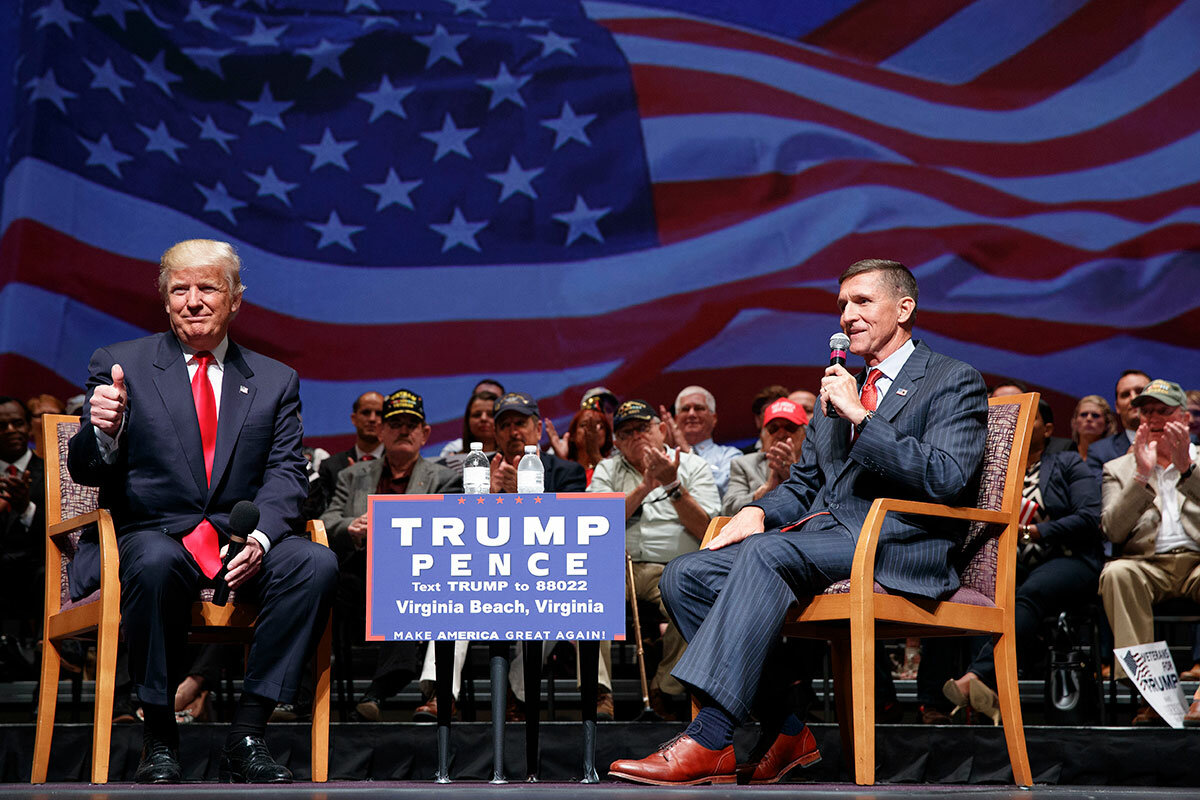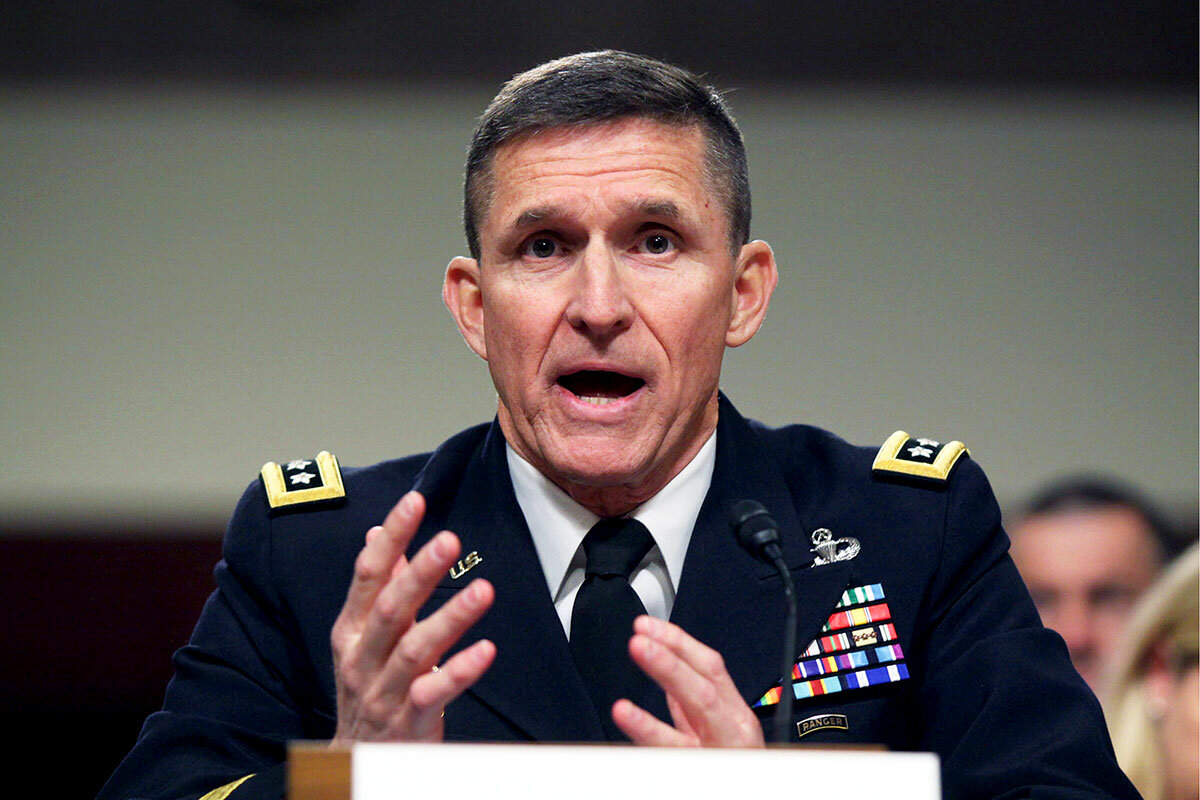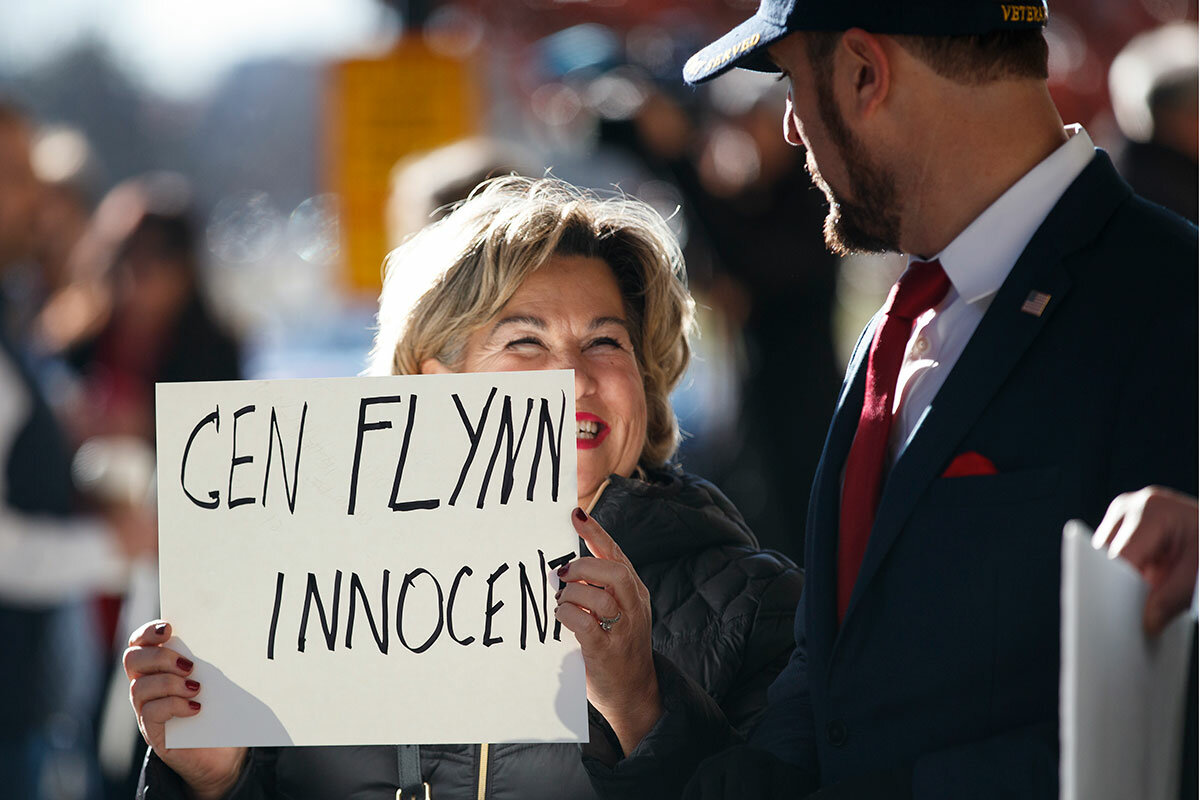Disgraced general to far-right hero: Michael Flynn rides the next wave
Loading...
| San Marcos, Calif.
The sun has already set outside the white-walled church as Michael Flynn walks onstage. The crowd inside the 1,100-capacity auditorium has thinned some after 10 hours of speeches and prayers and performances, but the closing speaker seems raring to go.
Lieutenant General Flynn, a former Army intelligence officer who served, briefly, as President Donald Trump’s first national security adviser, wears a blue palm-tree print blazer over a gray camouflage T-shirt with an eagle across the chest. Once described by Gen. Stanley McChrystal as “spring-loaded,” he radiates latent energy as he paces the stage in his brown boots.
It’s Mr. Flynn’s second speaking slot of the day at Reawaken America, the Christian-themed, MAGA-infused roadshow that he headlines. Since his morning pep talk, the audience has heard from anti-vaccine activists, election-fraud proponents, a gold-bar salesman, various GOP candidates, an assortment of pastors, and Eric Trump.
Why We Wrote This
Donald Trump’s former national security adviser is rallying the faithful and looking to future elections. He’s become an icon for a GOP base that’s increasingly suspicious of a corrupt “deep state” and elites.
Now it’s evening in Southern California. Mr. Flynn tells the crowd of mostly white, middle-aged men and women that they’re living “in an incredible moment in U.S. history.” But not in a positive sense: America, he says, is under threat from within.
“The people that are in charge of our government right now, they are intentionally trying to destroy our country,” he rasps into a microphone decorated in the colors of the flag. “These people, they’re not incompetent. They’re not stupid. They’re evil!”
For most senior military officers, retirement from active duty tees up a comfortable life of after-dinner speeches, seminars at military academies, and consulting gigs. Mr. Flynn is on a different circuit – one that taps into the combative politics of the president he served and is now a brand-building, cash-generating tour that’s taken on a life of its own.
Nearly six decades ago, historian Richard Hofstader published his famous essay, “The Paranoid Style in American Politics.” In it, he described the extreme right of the Republican Party as driven by a sense that America had been “largely taken away from them and their kind.” That paranoid wing gained unusual strength in the 1950s and ’60s with McCarthyism and the John Birch Society, which held that communist conspirators had permeated the highest levels of the U.S. government.
But while Republican leaders back then took decisive steps to quash the Birchers, today the balance of power in the party seems to have shifted. Former President Trump and his allies have fostered and benefitted from a widespread suspicion of “corrupt” institutions and entrenched elites, which has flourished in a hyper-online, polarized and atomized America.
And as Mr. Trump positions himself for a possible second run at the White House, his former national security adviser – a man who once held the nation’s top security clearance and was privy to its most closely-guarded secrets – is helping to lay the groundwork as a prominent voice for that anti-establishment, conspiracy-minded wing.
To his supporters, Mr. Flynn’s long military service, his loyalty to Mr. Trump, and above all his prosecution for lying to the FBI – a felony that was later wiped clean by a presidential pardon – make him both sympathetic and a symbol of everything that’s gone wrong in this country.
“He’s an American hero,” says Chad Vivas, an artist who presented the retired three-star general with a portrait of him in dress uniform with a bald eagle against a stormy sky. “And they framed him.”
Like many here, Mr. Vivas is happy to expound on a vast web of conspiracy theories involving global business elites, election fraud, vaccine mandates, and more. One of his paintings shows the Trump family beside a smoke-ringed Q, a nod to QAnon, the byzantine fantasy involving the former president and a secret war against deep-state pedophiles.
In his new role, Mr. Flynn can be seen “as a phenomenon of an age in which the right in America has bought into immense fantasy elements,” says Lawrence Rosenthal, a sociologist at the University of California, Berkeley, and founder of its Center for Right-Wing Studies.
It all seems a long way from the grinding post-9/11 wars that Mr. Flynn fought as an intelligence officer, building a reputation as a talented analyst and tactician. Still, a contrarian streak early on in his career signaled some of the troubles to come: He became a national-security insider, before a forced early retirement led him to Mr. Trump, the ultimate political outsider. His dizzying rise and fall in Washington – in the shadow of a Russian influence campaign and a flawed FBI investigation that continues to stoke controversy – left him with both significant legal fees and few career options.
Now he’s fully embracing outsider status, while building a platform that could elevate both his own profile and that of the former president, whether in pursuit of redemption, revenge, or both. At the same time, he’s feeding an outlook on the right that is increasingly alienated from mainstream institutions and convinced of their inherent rot – a worldview that will leave its stamp on American politics long after Mr. Trump and his allies have left the public stage.
Mr. Flynn ardently maintains that the 2020 election was “stolen,” calling it “the greatest fraud that our country has ever experienced,” despite more than 60 court rulings upholding Joe Biden’s victory.
And Mr. Flynn believes he himself was unfairly targeted by Mr. Trump’s political enemies. As he told the crowd, he’s seeking “accountability of the people that persecuted me.”
His long, strange journey isn’t over.
Democratic roots
Michael Thomas Flynn grew up in Middletown, Rhode Island, the sixth of nine children. His father served in the Army in World War II, fighting on the beaches of Normandy, and his grandfather fought in World War I. But he calls his mother, Helen, “the most courageous person I have ever known” for keeping order in a rowdy household while working and studying part-time for a law degree.
Helen was active in Democratic politics, raising money and even running for office. Mr. Flynn describes his family as “proud Democrats who loved America and all it stood for.”
He joined the Army in 1981 and rose through the ranks in the 82nd Airborne Division, where he met General McChrystal, who would become a key mentor. In 2004, then-Colonel Flynn was put in charge of intelligence analysis at the Joint Special Operations Command, an elite unit in Iraq that was hunting Al Qaeda.
“The only way to defeat [the enemy] was to get to know them better than they knew themselves,” he wrote in his memoir “The Field of Flight.”
Two years later, his unit tracked and killed Musab al-Zarqawi, the elusive leader of Al Qaeda in Iraq; he and General McChrystal inspected the corpse together.
Fresh from success in Iraq, he then served in Afghanistan as director of intelligence for U.S. forces. In January of 2010, Mr. Flynn coauthored a stinging report, published by a Washington think tank, on intelligence failures by the stalled U.S. mission. Among its recommendations was to make greater use of open-source information to fight insurgencies.
The report’s publication raised a stink at home. But Defense Secretary Robert Gates praised its candor, validating the general’s decision to go public and elevating his profile as a maverick thinker and rising star.
In an NPR interview that year, he said he was tapping the expertise of scholars in archeology, anthropology, and other disciplines to help understand Afghans better. “By bringing those subject-matter experts in, we see the battlefield in a much different light,” he said.
But Mr. Flynn’s own battles were just beginning.
A forced retirement
In 2012, he was nominated by President Barack Obama for a big promotion: director of the Defense Intelligence Agency, which analyzes foreign military capabilities.
Almost immediately, his efforts to overhaul the 17,000-employee bureaucracy went poorly. Morale sank at the agency. Obama administration officials began to question his leadership and judgment amid reports that he played loose with the facts to support his theories, particularly on Iran and militant Islam.
Two years later, Director of National Intelligence James Clapper showed him the door. He later said Mr. Flynn was angry at being forced to retire. “I think the termination ate at him,” he told NBC News in 2018.
In his memoir, the general claims he was fired for being too honest – for telling Congress that “we were not as safe as we had been a few years back.” He also blamed Mr. Obama personally for his removal. (In reality, experts say Mr. Obama likely had little direct contact with Mr. Flynn.)
His military career over, Mr. Flynn started a consulting company and began taking on foreign clients. In December 2015, he attended a gala dinner in Moscow for RT, the Kremlin-run media organization. He was paid $45,000 for his appearance and was seated at a table with President Vladimir Putin.
That wasn’t his first trip to Russia: As director of the DIA, he had met two years earlier with Russian intelligence officers in Moscow, ignoring the advice of the CIA’s station chief. When he tried to invite a Russian group to Washington in 2014, not long after Russia’s first invasion of Ukraine, Mr. Clapper reportedly had to warn him off.
During this time, Mr. Flynn also grew increasingly critical of the Obama administration’s foreign policy. He joined Mr. Trump’s team as an adviser, bringing military and national security credentials to the campaign at a time when few others were willing to do so. Soon, he became a popular surrogate on the campaign trail, offering fiery criticism of Democratic nominee Hillary Clinton. He also began sharing far-right conspiracies and memes on social media – falsely linking Secretary Clinton and her staff to child trafficking, for example, and alleging without grounds that Mr. Obama had laundered money for terrorists.
That rang alarm bells in Washington. Retired generals jawboning on TV about military or diplomatic strategy was one thing. But Mr. Flynn’s activities cut sharply against the “norm of nonpartisanship” that has traditionally guided former officers, says Heidi Urben, a retired Army colonel who teaches at Georgetown University. That norm has been stretched in recent years, she admits, but Mr. Flynn’s behavior “far exceeded” its boundaries.
In July 2016, he addressed the Republican National Convention, at a time when the FBI was investigating Mrs. Clinton’s use of a personal server to send classified emails. As he spoke, the crowd began chanting “Lock Her Up!” He nodded. “Damn right, you’re exactly right.” He clapped along to the chant, mouthing the words.
“If I did a tenth of what she did, I would be in jail today,” he said.
Six months later, Donald Trump was sworn in as president and Michael Flynn became his national security adviser.
The new boss
For the first week, staff at the National Security Council, which Mr. Flynn now headed, heard nothing from their new boss. Still, most knew him by reputation.
Some had read his memoir, which he co-wrote with Michael Ledeen, a hawkish foreign policy analyst. The book, which contains factual errors and no footnotes, warns of myriad enemies lurking at home and abroad. A former NSC staffer familiar with Mr. Flynn’s intelligence career was struck by its tone.
“His ideas went from thoughtful and careful to just all over the place,” says the staffer. “This is not the guy who was a two-star [general] briefing four-stars on intelligence in Afghanistan – and impressing everyone.”
When the new national security adviser finally called an all-staff meeting in January 2017, it raised new worries. Mr. Flynn spoke for around 30 minutes, mostly about President Trump’s campaign, and barely mentioned foreign policy. “It was all grievances on the home front,” says another former staffer. “He seemed unhinged.”
“Everybody was more alarmed after that meeting, not less,” says the first staffer.
But it was another meeting, held just days earlier in the same building, that was to prove most consequential.
Two FBI agents met with Mr. Flynn to ask him about his phone calls in late December with Sergey Kislyak, Russia’s ambassador to the U.S. At that time, the Obama administration had expelled 35 Russian diplomats and imposed sanctions on Russia for interfering in the 2016 election – including hacking and releasing emails from Mrs. Clinton and the Democratic National Committee.
Russia had unexpectedly taken no retaliatory measures. The agents wanted to know if Mr. Flynn, as the incoming national security adviser, had asked the ambassador not to escalate.
He told them no, they hadn’t discussed the sanctions. Asked if there had been a follow-up call with Ambassador Kislyak, he said he didn’t recall one. Pressed to clarify, he stuck to his account.
Both claims were false – as the FBI, which had transcripts of the calls, knew. It set off a storm that led to Mr. Flynn’s resignation less than a month into his tenure, after President Trump concluded he had lied not only to the FBI but also to Vice President Mike Pence, who had publicly repeated the denials.
Mr. Flynn eventually struck a plea deal with special counsel Robert Mueller, who was investigating Russian links to the Trump campaign. The deal would mean no prison time and would end a separate prosecution for illegal lobbying for Turkey.
In December 2017, he told a federal court in Washington that he took full responsibility.
“I recognize that the actions I acknowledged in court today were wrong, and, through my faith in God, I am working to set things right,” he said in a statement, calling his guilty plea “in the best interests of my family and of our country.”
“America’s general”
At home in Charlottesville, Virginia, Pasquale Scopelliti suspected a set-up.
A self-employed executive coach, he had gotten to know Mr. Flynn during the 2016 campaign, when he started emailing him unsolicited polling analysis and the general responded positively. To Mr. Scopelliti, the Russian investigation was a smokescreen, an effort to kneecap the new Trump administration. And the more he looked into Mr. Flynn’s case, the less it added up. “He was 100% innocent,” he says.
Central to this counter-narrative is the charge that it was the Clinton campaign that got the FBI to launch the Trump-Russia probe by funding the now-infamous dossier of “dirt” on Mr. Trump – much of which turned out to be false. When Mr. Flynn spoke to the FBI, his defenders say, he was walking into a trap. Moreover, his communications with the Russian ambassador weren’t inappropriate for an incoming national security adviser.
This view of Mr. Flynn as a martyr who took one for team Trump in the battle against a corrupt establishment makes him an unimpeachable star at events like Reawaken America, where he’s known to supporters as “America’s General.”
“He’s a hero. What he’s been through!” exclaims Anthony Lorenzo, as he stood in front of the eagle-themed painting. “He’s a true patriot.”
Mr. Lorenzo and his wife had driven from central California, where he installs electrical systems, for the two-day festival. The paintings were sandwiched between stalls touting dietary supplements, anti-vaccine books and videos, patriotic playing cards and T-shirts, scented candles, and, in a nearby room, two nonprofits based in Florida in which Mr. Flynn is involved, one as chairman.
In January 2020, Mr. Flynn formally withdrew his guilty plea before he could be sentenced, arguing that prosecutors had withheld exculpatory evidence. With the support of then-Attorney General William Barr, he sought to dismiss the case. According to Mr. Flynn’s attorney, Sidney Powell, his decision to cooperate had mostly been an effort to protect his son, who had been involved with his father’s foreign lobbying work.
Mr. Scopelliti, who had started a legal defense fund for him, was delighted. “They made an innocent man make a guilty plea,” he says.
Supporters point to the FBI’s own admission of serial errors in obtaining surveillance warrants for Carter Page, a Trump campaign aide, as evidence of a wider conspiracy. Another was the role of Peter Strzok, one of the agents who interviewed Mr. Flynn, who was fired in 2018 for sending anti-Trump text messages to a colleague with whom he was having an affair.
Yet the problematic warrants didn’t apply to Mr. Flynn, who led investigators directly to him with his calls to Russia’s ambassador. By that time, the FBI was five months into a counterintelligence investigation – and U.S. intelligence agencies had concluded that Russia had sought to tip the election to Mr. Trump. To take a call on a cellphone with a senior Russian official and not expect it to be monitored seems naïve, particularly for a former intelligence officer.
John Sipher, a former CIA officer who interacted with Mr. Flynn, thinks he must have known he “screwed up” – and then made it worse by lying. By doing so, he opened himself up to possible blackmail from Russian officials who knew the reality.
Mr. Sipher, who retired around the same time as Mr. Flynn after 28 years in the National Clandestine Service, sees parallels with earlier lapses in the general’s military career, such as when he improperly shared classified intelligence with allies in Afghanistan, or was reprimanded for similar breaches in Pakistan. “That stuff is beaten into us,” says the former CIA officer. But “the military is a whole different thing. They think they can get away with things.”
His next fight
On Nov. 25, 2020, three weeks after President Trump lost the election to Joe Biden, Mr. Flynn’s legal appeal became moot. “The president has pardoned General Flynn because he should never have been prosecuted,” the White House said in a statement.
At that point, the general was already at work on his next fight – to reverse Mr. Trump’s election defeat. Working with a team of lawyers, cyber experts and military veterans, he tried to persuade Mr. Trump to send federal officials to seize voting machines and ballots in contested states.
Had the president green-lit their plan, Mr. Flynn could have been Mr. Trump’s “field marshal,” says Patrick Byrne, the former chief executive of Overstock, who has spent millions of dollars on “election integrity” efforts in the wake of the 2020 vote. Instead, Mr. Trump rejected the proposal. It’s now a subject of inquiry for the House Select Committee on the Jan. 6 attack on the U.S. Capitol.
In San Marcos, Mr. Flynn told the crowd that he had “pled the Fifth” the previous day in his day-long deposition to the committee, which he derided as partisan.
But he left no doubt about his take on the 2020 election: It was stolen. “When somebody goes, ‘Where’s the evidence?’ I want to say… ‘Are you a moron?’” he said, raising a storm of laughter.
Mr. Trump’s own attorney general found no evidence of widespread fraud, and his cybersecurity chief declared the 2020 election the safest and most secure in history. In all, more than 90 judges, including some appointed by Mr. Trump, ruled against his campaign.
Recently, some GOP election-fraud activists have criticized Mr. Flynn for seeming more focused on the future – including his own. His main message at Reawaken America was that Trump supporters need to get involved in local politics and get ready for the next election. To keep fighting over the last one, at this point “is looking backwards,” he told the audience. “Now we have to look forwards.”
Mr. Flynn has endorsed challengers in several GOP primary contests and earned fees for political consulting. He’s also advising Mr. Byrne, whose nonprofit The America Project is training poll watchers in battleground states. In February, Mr. Flynn launched a slick new website and a book that bears the hallmarks of a possible political candidate-in-waiting.
Mr. Byrne, who describes Mr. Flynn as his “Yoda” and who moved to Florida to see him regularly, insists that’s the last thing that Mr. Flynn wants to do. He certainly wouldn’t run in 2024 against Mr. Trump. But if Mr. Trump doesn’t run and nobody else seems to be taking on “the swamp,” he could take the plunge, says Mr. Byrne.
“I know he doesn’t want to do that. I know his wife doesn’t want him to do that. But I think that he’s a guy who also does things out of a sense of duty,” he says.
It’s that sense of duty, not a desire for vindication, that counts, says Mr. Byrne. “I think Mike feels zero sense of a need of redemption. I think he’s been redeemed,” he says.
A “safe space”
In the parking lot of Del Rio beach, Mr. Flynn pulls on a wetsuit. It’s not yet 7 a.m., but several surfers are already bobbing in breakers near the shore, and he’s preparing to join them. The previous night, he’d announced on stage that he’d be going surfing the next morning – and anyone was welcome to join.
“General, when was the last time?” asks Scott, a local surfer who heeded the call.
“Thanksgiving, has to be,” says Mr. Flynn.
He and his impromptu surf buddies – eight men and his elder sister, Barbara – gather in a circle, boards on the sand, for a short prayer. “Our Father, who art in heaven,” he begins. Afterward, he crouches to wax his borrowed board.
At 63, Mr. Flynn still has the agility and build of the competitive swimmer and lifeguard that grew up riding the waves off Rhode Island, a passion he’s never forgotten.
Surfing, he told the Reawaken America crowd, is “my safe space. That’s how I get away from all the FBI guys.”
As the morning sun glints off the waves, Mr. Flynn hoists his board and paddles out to sea. Within minutes, he’s past the breakers and lined up with his companions. He kneels on his board and turns his head, waiting for the wave that will bear him forward.












